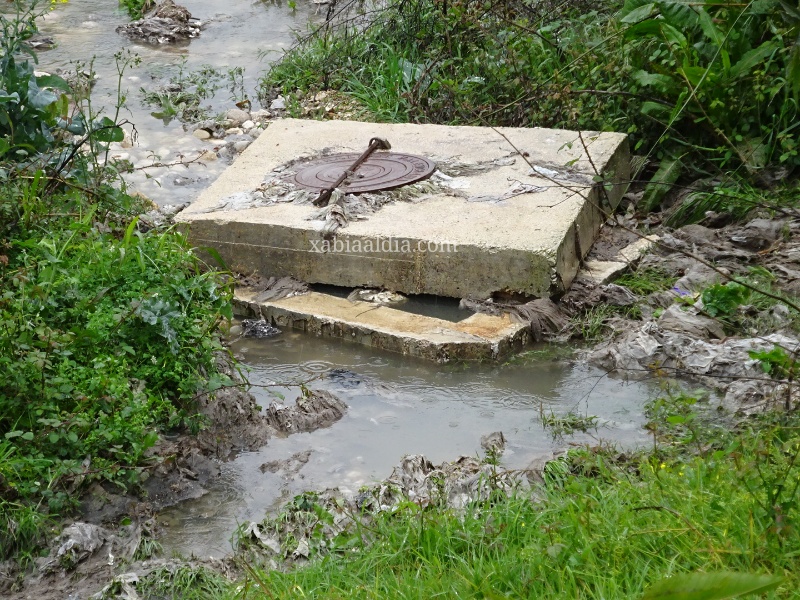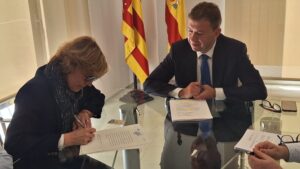Opposition parties welcome sewer problems being addressed “at last”
The opening in the sewer network in the river through which wipes and sewage poured out.

The opening in the canalization of the river through which wipes and sewage were being poured.
Monday 19th April 2021 | XÀBIA AL DÍA; translation MIKE SMITH
Last Thursday, April 15th, the spokesmen of the various political groups in Xàbia (with the exception of Ciudadanos por Jávea) met at the town hall to address one of the major problems of the municipality: the sewage network.
In the last plenary session, this historic system returned to the forefront of when Populares presented a motion that, despite not being read in its entirety as usual, called on the council to create a working group to address this issue as soon as possible and identify the requirements it should have to improve it.
The proposal went ahead and, after the first contact, it is intended to develop “a type of master plan with the necessary actions to alleviate deficiencies and update the sanitation network, the main infrastructure for wastewater management, rainwater and industrial,” according to municipal sources.
In the plenary, PP and Compromís were very sharp with this issue. Even the councilor of the nationalist party, Vicente Colomer, called for responsibilities to be cleared as, according to him, the problems in the sewer network go beyond the recently closed pipe and through which countless wipes were being poured and sewage to the river.
After the first meeting, the Populares spokeswoman, Rosa Cardona, was “happy” because, as she recalled, “last year, the PP presented a motion to address the impact that the last storms had had and the socialist government did not want to take it forward because they thought we were interfering with their skills. But it has been approved and we have started working on a work table together. And that’s very positive.”
“In Xàbia we have some big problems and the sewerage network is one of them that not only affects everyone. In the Primer Montañar there is no such network and the septic tanks are leaking onto the beach”, argues Cardona. “And then, in areas where there are, it does not comply with the rules of having two separate lines for both rainwater and waste. It has been allowed for people to join both together causing, among others, the problem of the wipes ending up in the sea”.
The representative pointed out that it needed to be made clear what maintenance is being carried out by AMJASA, the EPSAR (Public Entity for Wastewater Sanitation), its rigor and regularity, what is happening in the outlets or in the riverbed. “But let it not be a role that explains it to us, but the technicians themselves who know the viability and the options we have. In this first meeting it was agreed to have a real commitment and start a long process that must be for everyone.”
Compromís also valued last Thursday’s meeting as a positive thing “and that now they take it seriously” but they regret that these first steps have only begun to taken “when it has been publicly denounced” because, as they point out, it will be a long project, it will take many years, across some legislatures and it must be the responsibility of the one who commands at every moment”.
Colomer wanted to emphasize his speech at the last plenary when he noted that the sea not only begins at the drains (in reference to the new municipal campaign) but begins in the council itself and the effort of the administration could not only focus on the awareness. The representative said that “we must believe and be clear that we must end the spills, leaks of submarine outfalls (such as Arenal) and have the network in the best conditions with all the reports of the administrations involved and make clear the importance of the water cycle”.
Compromís also suggested the need to ask for European aid to address this type of problem and the new state government to address this local shortage.
Finally, the spokesman for Ciudadanos, Enrique Escrivá said that he is following the same line as his colleagues in the council and adds that “urgent measures must be taken so that episodes such as those of a few weeks ago (the dumping of wipes and sewage into the river through an opening in the canal) do not happen again ”.
Escrivá agrees that a detailed inspection of the network must be carried out (which he believes has to start from scratch since it has been a responsibility of a government that has been in power for ten years) but that it must attend, at a particular level, to the environmental problems and obstructions that have occurred recently. The councilor has said that the use of cameras to inspect the sewer will be contracted and proposes “studying its long-term viability and implementing monitoring systems to detect waste accumulations as a preventive measure.”
In ecological terms, he advocates making sustainability and environmental protection “basic premises of the Master Plan and thinking about what can be done with the treated water that, so far, we have tipped into the sea.” In this sense (and like Compromís) is committed to completing the full water cycle and that the treatment can be reused for irrigation, for example. “It would be useful to take advantage of this working committee to listen to all people in related sectors such as irrigators,” he said.
Ciudadanos are in favour of making public the minutes of these meetings in a prominent section of the municipal website “so that the people of Xàbia can know, first hand, the work and decisions we take from the Council.”




